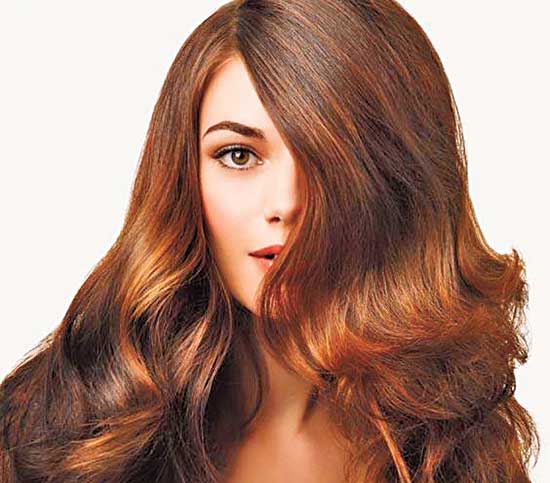What you eat can have a great impact on your hair. You! takes a look...
What you eat can have a great impact on your hair. You! takes a look...
Our hair is amongst the first things that people notice. Believe it or not but lustrous hair is bound to impress many and leave others envious. However, pollution and harmful rays of the sun may damage one’s hair. Many girls opt for hair dye and other treatments that can leave the hair damaged for good. Fret not girls, as you can still have beautiful and shiny hair. All you have to do is head to the kitchen and eat right. Yes, all the vitamins and minerals required to keep your hair strong are found in food items that can be consumed easily on a daily basis.

Here are some of the foods that you can incorporate in your day-to-day diet and have shiny, beautiful hair in matter of days:
Carbohydrate rich foods are a good source of B complex vitamins that are vital for healthy hair. Take note that 55-60% of your daily calories should come from carbohydrates as they are an essential source of energy and help in the growth of body tissues. Hence, it is important to consume more of complex carbohydrates like vegetables, fruits, whole grains and brown rice.
Protein is the building block of hair, so a diet for healthy hair should have a good amount of protein in it. Protein provides strength to the shaft of the hair and reduces chances of hair fall. Foods high in protein are soy, tofu, dairy products like milk, curd, cheese, nuts, oilseeds, beans and pulses. Remember that inadequate protein intake for a long period can cause major hair fall and affect the texture and quality of the hair.
Along with a proper diet, healthy hair needs essential fatty acids that can aid dry and brittle. Essential fatty acids can be obtained from vegetable oils, whole grains, legumes, fresh nuts and oil seeds, spirulina, flaxseed oil and pumpkin seeds. Roughly 15 - 20% of your daily calories should come from these sources.
Vitamin A is essential for hair growth and a healthy scalp. This can be obtained by consuming green and yellow vegetables and fruits like sweet potatoes, broccoli, apricots etc.
Vitamin E improves circulation, thereby improving hair health and growth. Add vitamin E to your diet by consuming foods like avocados, rice bran, nuts, dark green vegetables, legumes and whole grains.
This lesser known vitamin helps to maintain healthy hair. Food sources of Vitamin K include dairy foods, figs, asparagus, broccoli, lettuce, Brussels sprout, cabbage, dark green leafy vegetables, oatmeal, soybeans, wheat and yoghurt.
To ensure that your hair is healthy and does not split, include foods rich in B vitamins. These include whole grains, beans, lentils, plenty of fresh fruits and vegetables, especially citrus fruits and tomatoes. Biotin deficiency has also been linked to hair loss. Foods high in biotin are brown rice, cracked wheat, green peas, lentils, oats, soybeans, sunflower seeds and walnuts. Deficiency of B complex vitamins can lead to greasy hair, dandruff, poor hair growth and grey hair.
If you have enough vitamin C you will have strong, supple strands of hair that do not split. Vitamin C is an important antioxidant that promotes cell and tissue repair and enhances the immune system. Good sources of vitamin C are all citrus fruits like oranges, lime, lemon, berries, vegetables like cucumbers, tomatoes, cauliflower, green leafy vegetables and red peppers.
Iron helps to carry oxygen to the hair. Without enough iron, hair and its follicles are starved of oxygen. You can increase your iron intake by eating dark green vegetables, whole grains, garden cress seeds or by adding iron supplements under supervision.
Magnesium is an important mineral for hair growth. It can be obtained from foods like whole grains, green leafy vegetables, dairy products, fruits, nuts and pulses.
Zinc builds hair protein and thus plays a vital role in maintaining good hair condition. Zinc stimulates hair growth by improving immunity. Its deficiency often results in poor hair growth and considerable hair loss. Natural sources of zinc are legumes, mushrooms, non-fat dry milk, spinach, whole grains, pumpkin seeds, sunflower seeds.
Water makes up one-fourth of the weight of a strand of hair. Moisture makes the hair supple, so make sure you get plenty of fluids. Water is a medium that helps to eliminate all toxins, chemical wastes and other pollutants from the body. Water not only hydrates our bodies, but also keeps our hair silky and shiny. Ideally, you should drink between eight to ten glasses of water a day.
* Hair fall and baldness is increasing in people who follow an unhealthy eating pattern, have a stressed lifestyle and consume junk food.
* Hair fall can also be caused by anxiety, insomnia or excessive use of chemicals like bleaching treatments, perming and colouring.
* Sugar is highly acidic and consuming it often destroys B vitamins and decreases minerals, leading to unhealthy hair.
* Soft drinks, caffeine, alcohol, and nicotine also have detrimental effects on the nutrients that enhance hair growth.
* Stress, tension, some medications and poor dietary habits are known to delay hair growth.